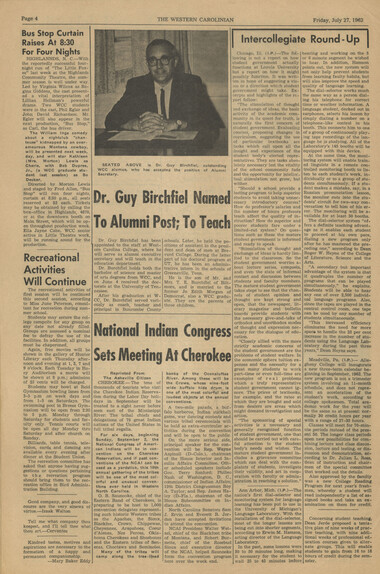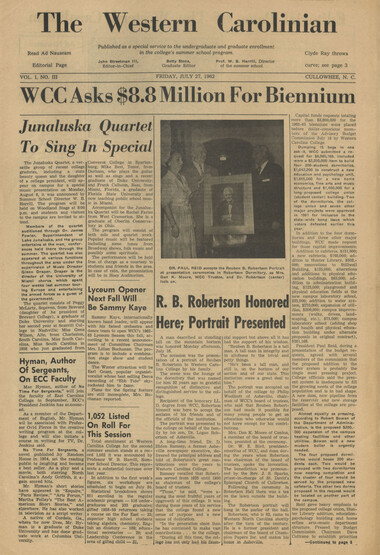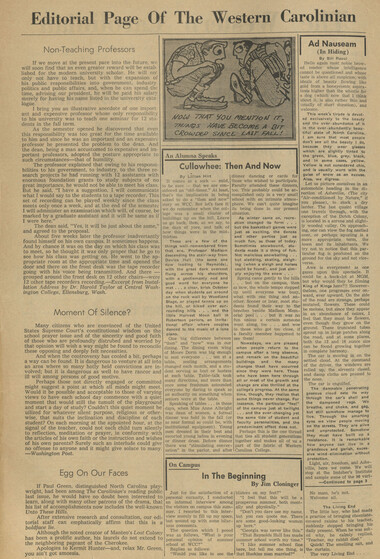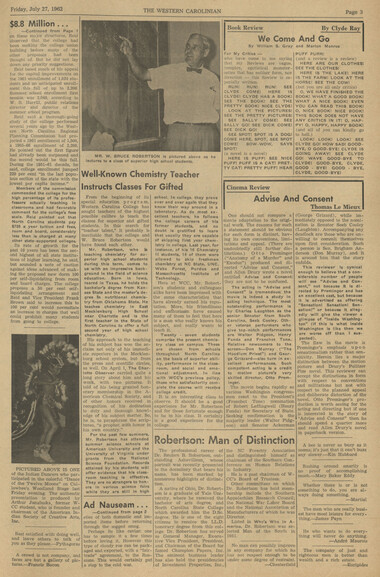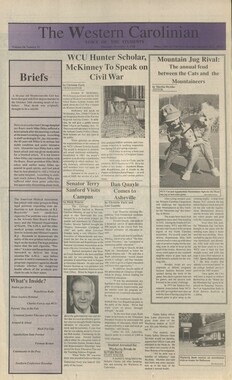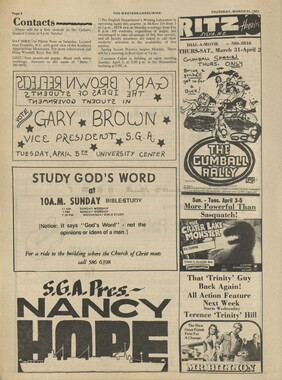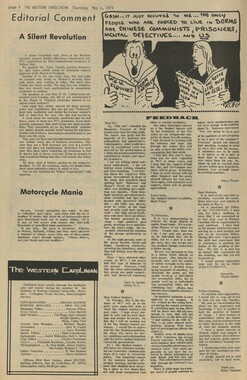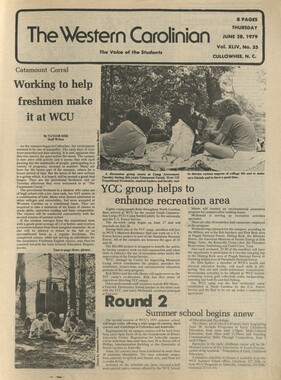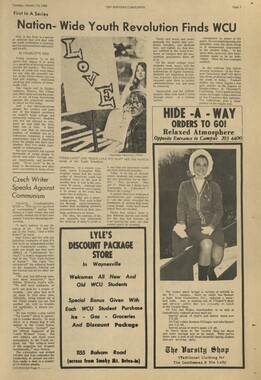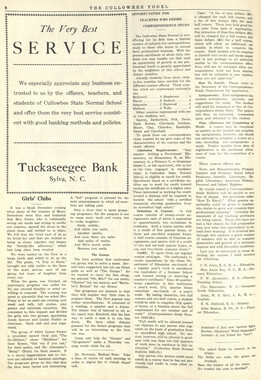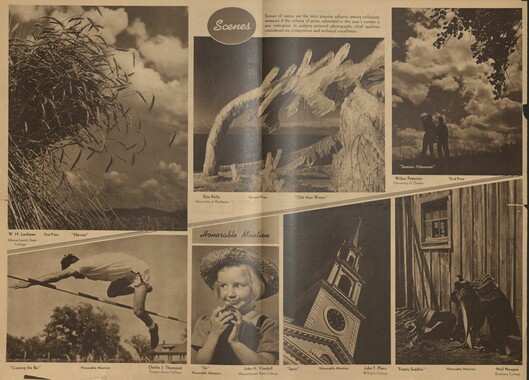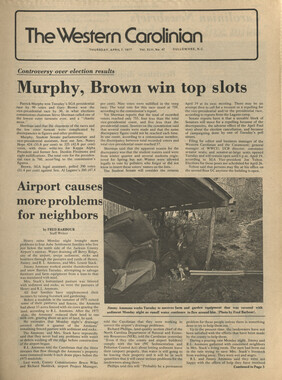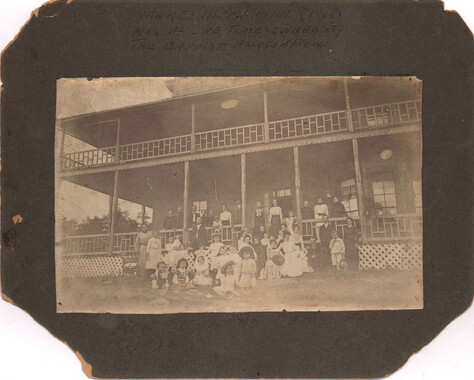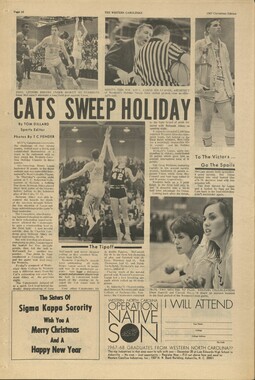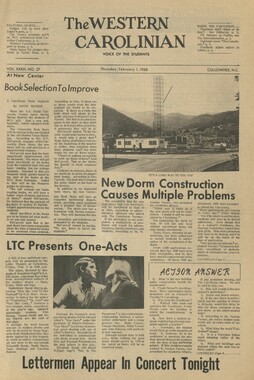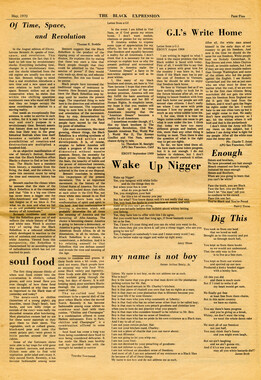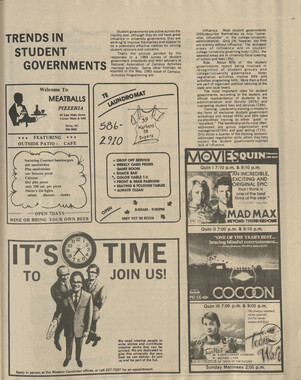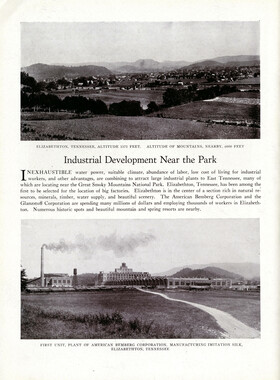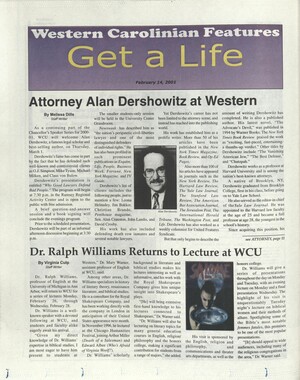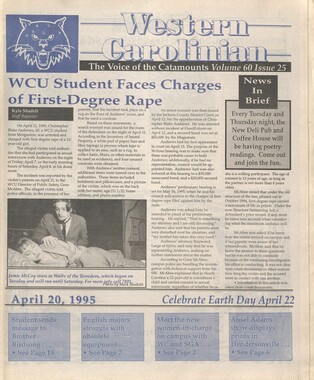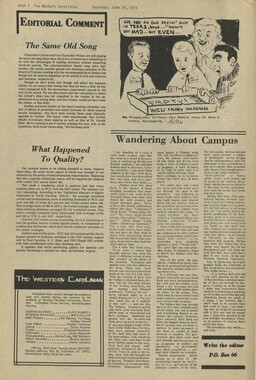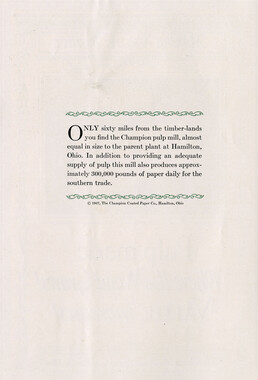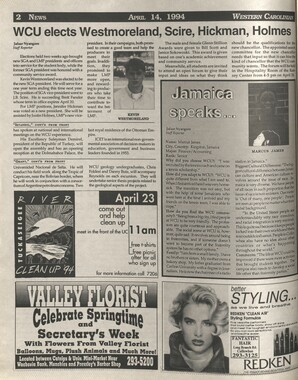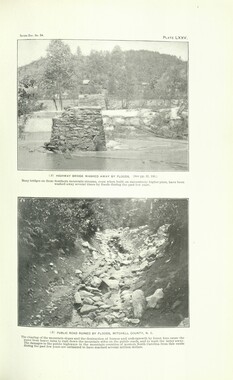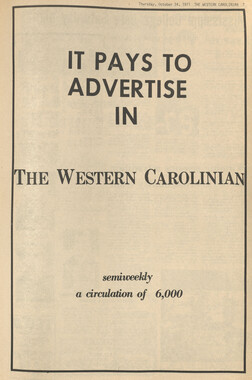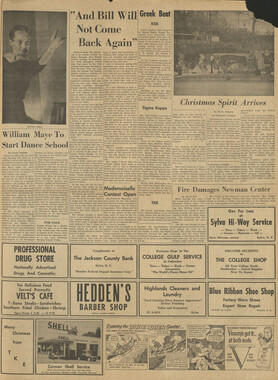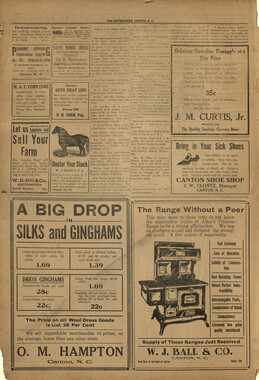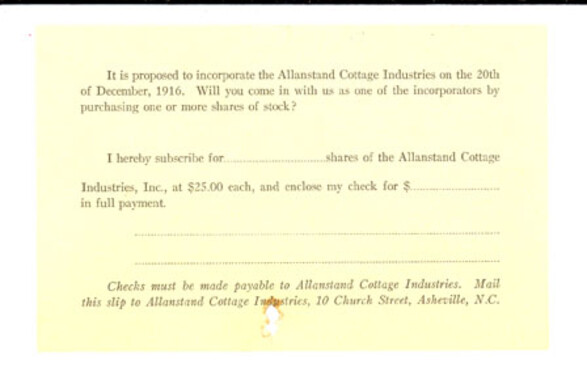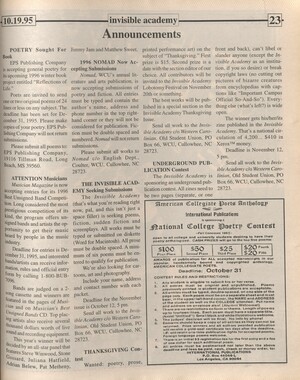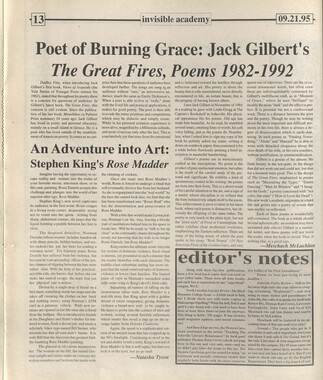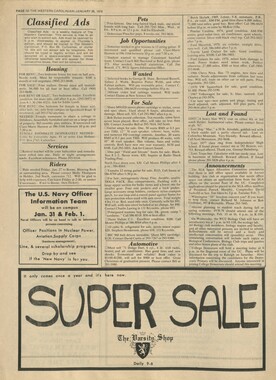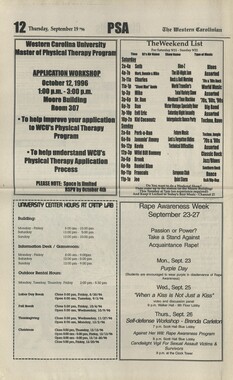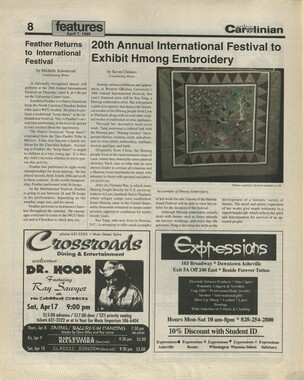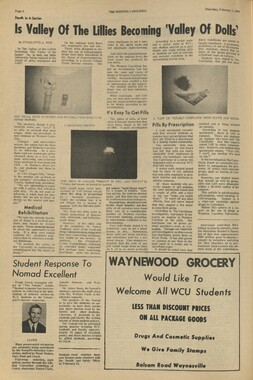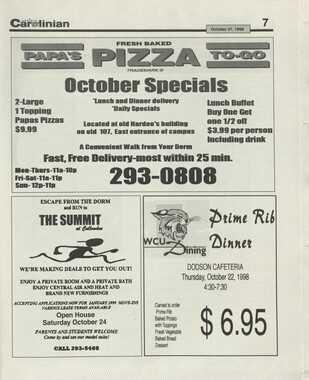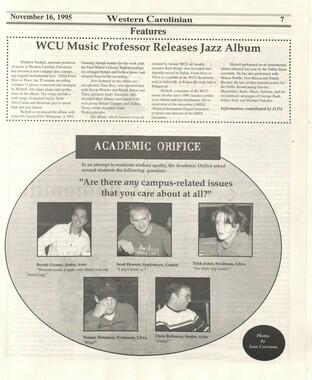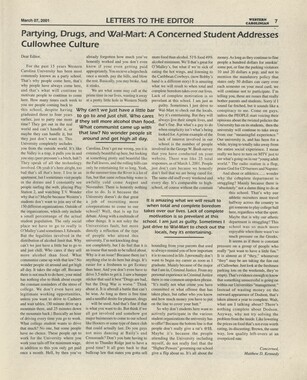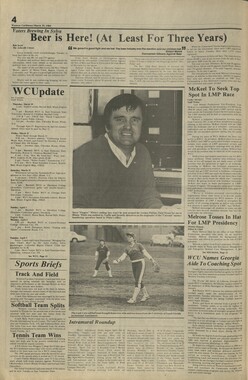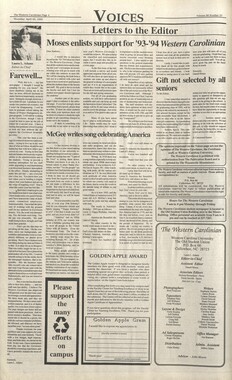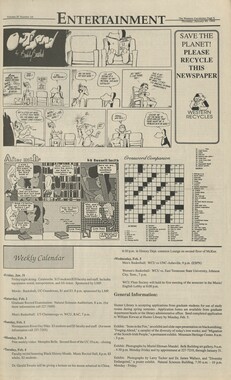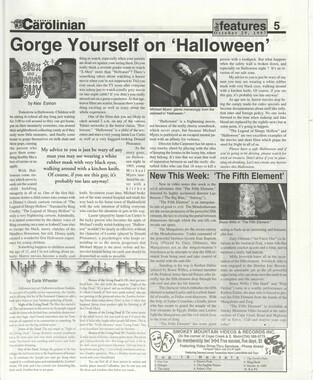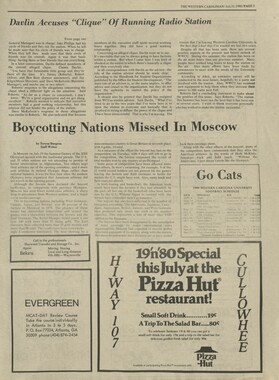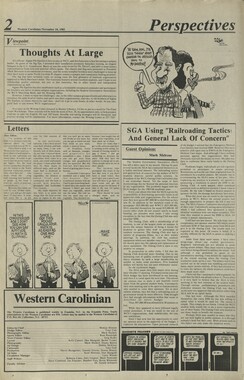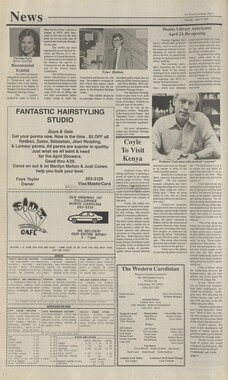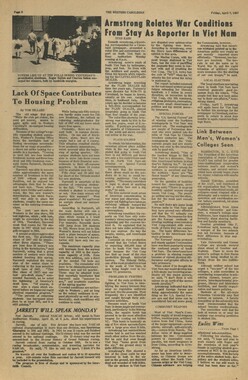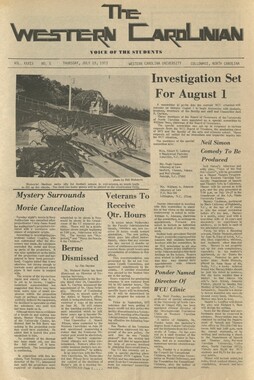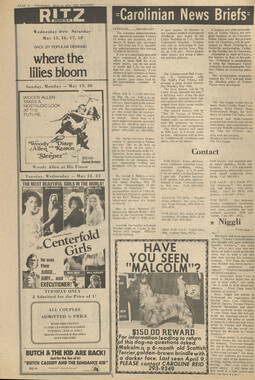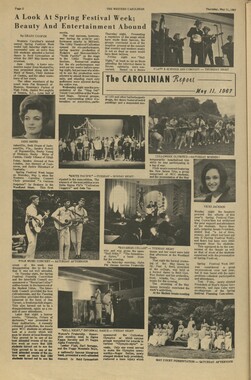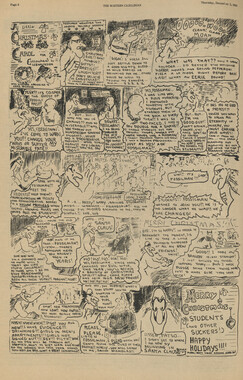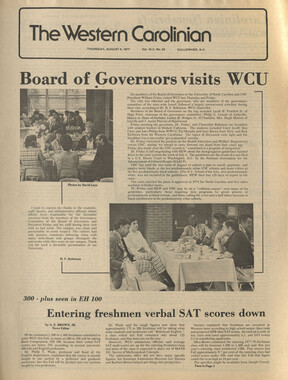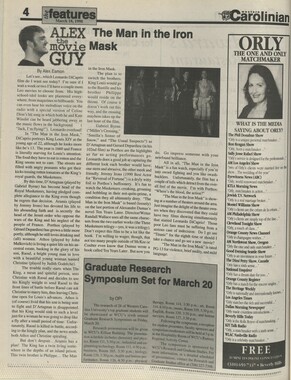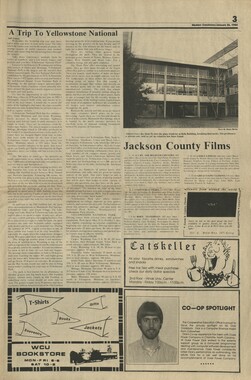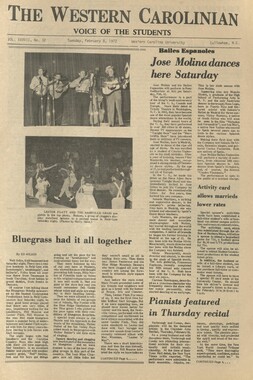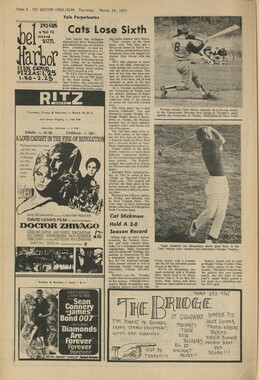Western Carolina University (20)
View all
- Canton Champion Fibre Company (2308)
- Cherokee Traditions (292)
- Civil War in Southern Appalachia (165)
- Craft Revival (1942)
- Great Smoky Mountains - A Park for America (2766)
- Highlights from Western Carolina University (430)
- Horace Kephart (941)
- Journeys Through Jackson (154)
- LGBTQIA+ Archive of Jackson County (81)
- Oral Histories of Western North Carolina (314)
- Picturing Appalachia (6772)
- Stories of Mountain Folk (413)
- Travel Western North Carolina (160)
- Western Carolina University Fine Art Museum Vitreograph Collection (129)
- Western Carolina University Herbarium (92)
- Western Carolina University: Making Memories (708)
- Western Carolina University Publications (2283)
- Western Carolina University Restricted Electronic Theses and Dissertations (146)
- Western North Carolina Regional Maps (71)
- World War II in Southern Appalachia (131)
University of North Carolina Asheville (6)
View all
- Western Carolina College (199)
- Western Carolina Teachers College (239)
- Western Carolina University (1792)
- Allanstand Cottage Industries (0)
- Appalachian National Park Association (0)
- Bennett, Kelly, 1890-1974 (0)
- Berry, Walter (0)
- Brasstown Carvers (0)
- Cain, Doreyl Ammons (0)
- Carver, George Washington, 1864?-1943 (0)
- Cathey, Joseph, 1803-1874 (0)
- Champion Fibre Company (0)
- Champion Paper and Fibre Company (0)
- Cherokee Indian Fair Association (0)
- Cherokee Language Program (0)
- Crittenden, Lorraine (0)
- Crowe, Amanda (0)
- Edmonston, Thomas Benton, 1842-1907 (0)
- Ensley, A. L. (Abraham Lincoln), 1865-1948 (0)
- Fromer, Irving Rhodes, 1913-1994 (0)
- George Butz (BFS 1907) (0)
- Goodrich, Frances Louisa (0)
- Grant, George Alexander, 1891-1964 (0)
- Heard, Marian Gladys (0)
- Kephart, Calvin, 1883-1969 (0)
- Kephart, Horace, 1862-1931 (0)
- Kephart, Laura, 1862-1954 (0)
- Laney, Gideon Thomas, 1889-1976 (0)
- Masa, George, 1881-1933 (0)
- McElhinney, William Julian, 1896-1953 (0)
- Niggli, Josephina, 1910-1983 (0)
- North Carolina Park Commission (0)
- Osborne, Kezia Stradley (0)
- Owens, Samuel Robert, 1918-1995 (0)
- Penland Weavers and Potters (0)
- Rhodes, Judy (0)
- Roberts, Vivienne (0)
- Roth, Albert, 1890-1974 (0)
- Schenck, Carl Alwin, 1868-1955 (0)
- Sherrill's Photography Studio (0)
- Smith, Edward Clark (0)
- Southern Highland Handicraft Guild (0)
- Southern Highlanders, Inc. (0)
- Stalcup, Jesse Bryson (0)
- Stearns, I. K. (0)
- Thompson, James Edward, 1880-1976 (0)
- United States. Indian Arts and Crafts Board (0)
- USFS (0)
- Vance, Zebulon Baird, 1830-1894 (0)
- Weaver, Zebulon, 1872-1948 (0)
- Western Carolina University. Mountain Heritage Center (0)
- Whitman, Walt, 1819-1892 (0)
- Wilburn, Hiram Coleman, 1880-1967 (0)
- Williams, Isadora (0)
- 1920s (57)
- 1930s (69)
- 1940s (114)
- 1950s (66)
- 1960s (314)
- 1970s (599)
- 1980s (406)
- 1990s (379)
- 2000s (195)
- 2010s (83)
- 1600s (0)
- 1700s (0)
- 1800s (0)
- 1810s (0)
- 1820s (0)
- 1830s (0)
- 1840s (0)
- 1850s (0)
- 1860s (0)
- 1870s (0)
- 1880s (0)
- 1890s (0)
- 1900s (0)
- 1910s (0)
- 2020s (0)
- Jackson County (N.C.) (2282)
- Appalachian Region, Southern (0)
- Asheville (N.C.) (0)
- Avery County (N.C.) (0)
- Blount County (Tenn.) (0)
- Buncombe County (N.C.) (0)
- Cherokee County (N.C.) (0)
- Clay County (N.C.) (0)
- Graham County (N.C.) (0)
- Great Smoky Mountains National Park (N.C. and Tenn.) (0)
- Haywood County (N.C.) (0)
- Henderson County (N.C.) (0)
- Knox County (Tenn.) (0)
- Knoxville (Tenn.) (0)
- Lake Santeetlah (N.C.) (0)
- Macon County (N.C.) (0)
- Madison County (N.C.) (0)
- McDowell County (N.C.) (0)
- Mitchell County (N.C.) (0)
- Polk County (N.C.) (0)
- Qualla Boundary (0)
- Rutherford County (N.C.) (0)
- Swain County (N.C.) (0)
- Transylvania County (N.C.) (0)
- Watauga County (N.C.) (0)
- Waynesville (N.C.) (0)
- Yancey County (N.C.) (0)
- Newsletters (510)
- Publications (documents) (1773)
- Aerial Photographs (0)
- Aerial Views (0)
- Albums (books) (0)
- Articles (0)
- Artifacts (object Genre) (0)
- Bibliographies (0)
- Biography (general Genre) (0)
- Cards (information Artifacts) (0)
- Clippings (information Artifacts) (0)
- Crafts (art Genres) (0)
- Depictions (visual Works) (0)
- Design Drawings (0)
- Drawings (visual Works) (0)
- Envelopes (0)
- Facsimiles (reproductions) (0)
- Fiction (general Genre) (0)
- Financial Records (0)
- Fliers (printed Matter) (0)
- Glass Plate Negatives (0)
- Guidebooks (0)
- Internegatives (0)
- Interviews (0)
- Land Surveys (0)
- Letters (correspondence) (0)
- Manuscripts (documents) (0)
- Maps (documents) (0)
- Memorandums (0)
- Minutes (administrative Records) (0)
- Negatives (photographs) (0)
- Newspapers (0)
- Occupation Currency (0)
- Paintings (visual Works) (0)
- Pen And Ink Drawings (0)
- Periodicals (0)
- Personal Narratives (0)
- Photographs (0)
- Plans (maps) (0)
- Poetry (0)
- Portraits (0)
- Postcards (0)
- Programs (documents) (0)
- Questionnaires (0)
- Scrapbooks (0)
- Sheet Music (0)
- Slides (photographs) (0)
- Songs (musical Compositions) (0)
- Sound Recordings (0)
- Specimens (0)
- Speeches (documents) (0)
- Text Messages (0)
- Tintypes (photographs) (0)
- Transcripts (0)
- Video Recordings (physical Artifacts) (0)
- Vitreographs (0)
- The Reporter, Western Carolina University (510)
- WCU Students Newspapers Collection (1744)
- A.L. Ensley Collection (0)
- Appalachian Industrial School Records (0)
- Appalachian National Park Association Records (0)
- Axley-Meroney Collection (0)
- Bayard Wootten Photograph Collection (0)
- Bethel Rural Community Organization Collection (0)
- Blumer Collection (0)
- C.W. Slagle Collection (0)
- Canton Area Historical Museum (0)
- Carlos C. Campbell Collection (0)
- Cataloochee History Project (0)
- Cherokee Studies Collection (0)
- Daisy Dame Photograph Album (0)
- Daniel Boone VI Collection (0)
- Doris Ulmann Photograph Collection (0)
- Elizabeth H. Lasley Collection (0)
- Elizabeth Woolworth Szold Fleharty Collection (0)
- Frank Fry Collection (0)
- George Masa Collection (0)
- Gideon Laney Collection (0)
- Hazel Scarborough Collection (0)
- Hiram C. Wilburn Papers (0)
- Historic Photographs Collection (0)
- Horace Kephart Collection (0)
- Humbard Collection (0)
- Hunter and Weaver Families Collection (0)
- I. D. Blumenthal Collection (0)
- Isadora Williams Collection (0)
- Jesse Bryson Stalcup Collection (0)
- Jim Thompson Collection (0)
- John B. Battle Collection (0)
- John C. Campbell Folk School Records (0)
- John Parris Collection (0)
- Judaculla Rock project (0)
- Kelly Bennett Collection (0)
- Love Family Papers (0)
- Major Wiley Parris Civil War Letters (0)
- Map Collection (0)
- McFee-Misemer Civil War Letters (0)
- Mountain Heritage Center Collection (0)
- Norburn - Robertson - Thomson Families Collection (0)
- Pauline Hood Collection (0)
- Pre-Guild Collection (0)
- Qualla Arts and Crafts Mutual Collection (0)
- R.A. Romanes Collection (0)
- Rosser H. Taylor Collection (0)
- Samuel Robert Owens Collection (0)
- Sara Madison Collection (0)
- Sherrill Studio Photo Collection (0)
- Smoky Mountains Hiking Club Collection (0)
- Stories of Mountain Folk - Radio Programs (0)
- Venoy and Elizabeth Reed Collection (0)
- WCU Gender and Sexuality Oral History Project (0)
- WCU Mountain Heritage Center Oral Histories (0)
- WCU Oral History Collection - Mountain People, Mountain Lives (0)
- Western North Carolina Tomorrow Black Oral History Project (0)
- William Williams Stringfield Collection (0)
- Zebulon Weaver Collection (0)
- College student newspapers and periodicals (1769)
- African Americans (0)
- Appalachian Trail (0)
- Artisans (0)
- Cherokee art (0)
- Cherokee artists -- North Carolina (0)
- Cherokee language (0)
- Cherokee pottery (0)
- Cherokee women (0)
- Church buildings (0)
- Civilian Conservation Corps (U.S.) (0)
- Dams (0)
- Dance (0)
- Education (0)
- Floods (0)
- Folk music (0)
- Forced removal, 1813-1903 (0)
- Forest conservation (0)
- Forests and forestry (0)
- Gender nonconformity (0)
- Great Smoky Mountains National Park (N.C. and Tenn.) (0)
- Hunting (0)
- Landscape photography (0)
- Logging (0)
- Maps (0)
- Mines and mineral resources (0)
- North Carolina -- Maps (0)
- Paper industry (0)
- Postcards (0)
- Pottery (0)
- Railroad trains (0)
- Rural electrification -- North Carolina, Western (0)
- School integration -- Southern States (0)
- Segregation -- North Carolina, Western (0)
- Slavery (0)
- Sports (0)
- Storytelling (0)
- Waterfalls -- Great Smoky Mountains (N.C. and Tenn.) (0)
- Weaving -- Appalachian Region, Southern (0)
- Wood-carving -- Appalachian Region, Southern (0)
- World War, 1939-1945 (0)
- Text (2283)
- MovingImage (0)
- Sound (0)
- StillImage (0)
Western Carolinian Volume 01(28) Number 03
Item
Item’s are ‘child’ level descriptions to ‘parent’ objects, (e.g. one page of a whole book).
-
-
Page 4 THE WESTERN CAROLINIAN Friday, July 27, 1962 Bus Stop Curtain Raises At 8:30 For Four Nights HIGHLANNDS, N. C—With the reportedly successful four- night run of "The Little Foxes" last week at the Highlands Community Theatre, the summer season is well under way. Led by Virginia Wilcox as Re- gina Giddens, the cast presented a vital interpretation of Lillian Hellman's powerful drama. Two WCC students were in the cast, Phil Eglar and John David Richardson. Mr. Egler will also appear in the next production, "Bus Stop," as Carl, the bus driver. The William Inge comedy about a nightclub "chan- teu,se" kidnapped by an over- amourous Montana cowboy, will be presented next week, day, and will star Kathleen (Mrs. Morton) Lewis as Cherie, with Bob Dupree, Jr., (a WCC graduate student last session) as Bo Decker. Directed by Morton Lewis and staged by Fred Allen, "Bus Stop" will run four nights, curtain at 8:30 p.m., all seats reserved at $2 each. Tickets may be obtained by calling the box-office in Highlands, 4870, or at the downtown booth on Main Street, which will be open throughout production week. Ella Jayne Cabe, WCC senior active in Little Theatre work, will be running sound for the production. Intercollegiate Round-Up SEATED ABOVE is Dr. Guy Blrchfiel, outstanding WCC alumus, who has accepted the position of Alumni Secretary. Dr. Guy Birchfiel Named To Alumni Post; To Teach Recreational Activities Will Continue The recreational activities of first session will be continued this second session, according to Miss June Peterson, consultant for recreation during summer school. Students may secure the college campsite for any group on any date not already filled. Groups are assessed a nominal fee to defray the use of the facilities. In addition, all groups must be chaperoned. Again, free movies will be shown in the gallery of Hunter Library each Thursday afternoon and evening at 1, 3, 7 and 9 o'clock. Each Tuesday in Hoey Auditorium a movie will be shown at 8 p.m.; admission of 25 cents will be charged. Students may bowl at Reid Gymnasium bowling lanes from 3-5 p.m .on week days and from 1-5 on Saturdays. The swimming pool in Breese Gymnasium will be open from 2:30 to 5 p.m. Monday through Saturday for students and faculty only. Tennis courts will be open all day Monday thru Saturday and after church on Sunday. Billiards, table tennis, television, cards and dancing are available every evening after dinner at the Student Union. The recreation committee has asked that anyone having suggestions or questions pertaining to the recreation program should bring them to the recreation office in Bird Administration Building. Dr. Guy Birchfiel has been appointed to the staff at Western Carolina College, where he will serve as alumni executive secretary and will teach in the education department. Dr. Burchfiel holds both the bachelor of science and master of arts degrees from WCC, and on June 4 received the doctorate at the University of Tennessee. After his graduation at W- CC, Dr. Burchfiel served variously as coach, teacher and principal in Buncombe County schools. Later, he held the positions of assistant to the president and dean of men at Brevard College. During the latter part of his doctoral program at UT, he has been an administrative intern in the schools of Greeneville, Tenn. He is the son of Mr. and Mrs. T. E. Burchfiel of Bilt- more, and is married to the former Jo Edith Morgan of Democrat, also a WCC graduate. They are the parents of three children. National Indian Congress Sets Meeting At Cherokee Good company, and good discourse are the very sinews of virtue.—Izaak Walton Tell me what company thou keepest, and I'll tell thee what thou art.—Cervantes Kindred tastes, motives and aspirations are necessary to the formation of a happy and permanent companionship. —Mary Baker Eddy- Reprinted From The Asheville Citizen CHEROKEE — The tens of thousands of tourists who visit the Cherokee Indian Reservation during the Labor Day holidays in September will be treated to a sight never before seen east of the Mississippi River: The tribal chiefs and delegations of 75 great Indian nations of the United States in full tribal regalia. For six days, beginning Sunday, September 2, the National Congress of American Indians will be in convention on the Cherokee Reservation, and if past conventions of the NCAI can be used as a yardstick, this 19th annual gathering of the tribes will be one of the most colorful and unusual conventions ever held in Western North Carolina. O. B. Saunooke, chief of the Eastern Band of Cherokees, is preparing to be host to 1,000 convention delegates representing such historic Western tribes as the Apaches, the Sioux, Blackfee, Crows, Chippewas, Cheyennes, Arapahoes, Coeur d'Alenes, Nez Perces, Oklahoma Cherokees and Shoshones and the Eastern tribes of Sen- ecas, Choctaws and Seminoles. Many of the tribes will camp along the tree-IJned banks of the Oconaluftee River. Among these will be the Crows, whose nine-foot wide buffalo hide drum is one of the most colorful and loudest objects at the annual conventions. A two-mile parade, a buffalo barbecue, Indian stickball game, war dancing contests and various tribal ceremonials will be held as extra-curricular activities during the convention and will be open to the public. On the more serious side, principal speaker for the convention will be Rep. Wayne Aspinall (D-Colo.), chairman of the House Interior and Insulin Affairs Committee. Other scheduled speakers include Gov. Terry Sanford; Philleo Nash of Washington, D. C, commissioner of Indian Affairs; 12th District Congressman Roy A. Taylor; and Rep. James Haley (D-Fla.), chairman of the House Subcommittee on Indian Affairs. North Carolina Senators Sam J. Ervin and Everett B. Jordan have accepted invitations to attend the convention. NCAI President Walter Wetzel, chief of the Blackfoot tribe of Montana, and Robert Bur- nette, chief of the Rosebud Sioux and executive director of the NCAI, helped Saunooke form the convention program here over the week end. Chicago, 111. (I.P.)—The following report on how student government actually functions at Loyola Uni\ but a report on how it might y function. It was written in hone of suggesting a vision or a direction whi h student government might take. Excerpts and highlights of the report follow: stimulation of thought jnd exchange of ideas, the basic activity of the academic community in its quest for truth, is naturally the first concern of student government. Evaluating courses, proposing changes in curriculum, suggesting the use of particular textbooks are tasks which call upon all the insight and experience of the student body's elected representatives. They are tasks absolutely necessary lest the vitality of the school community fade and the opportunity for intellectual stimulation not grow, but wither. "Should a school provide a testing program to help superior students to avoid taking unnecessary introductory courses? How do professor's salaries and the number of hours profesors teach affect the quality of instruction? How do superior and poorer students fare under a limited-cut system? On questions such as these the mature student government is informed and ready to speak. "Stimulation of thought and exchange of ideas is hardly limited to the classroom. So the student government worries a- bout lecture series, symposia, and even the state of informal contact and discussion between students and faculty members. The mature student government takes steps to see that the channels of student opinion and thought are kept strong and open, that the newspaper, literary magazine and bulletin boards provide students with the necessary give-and-take of orthodox and unorthodox modes of thought and expression necessary for the dialogue of education. "Closely allied with the more strictly academic concerns of the student government are the problems of student welfare. In the economic sphere tuition expenses and the necessity for a great many students to work part-time or even full-time are examples of real problems which a truly representative student government cannot ignore. The prices of textbooks, for example, and the rates at which they are bought and sold from dealers are areas which might demand investigation and action. "The sponsoring of special activities is a necessary and generally recognized funciton of student government, one that should be carried out with careful attention to the student body's needs and wishes. The mature student government includes a grievance committee which can deal with the complaints of students, investigate their validity, and act in cooperation with faculty or administration in reaching a solution." hearing and working on the 5 or il minute segment he wished to hear. In addition, Hamson points out, the new system will not only help prevent students from learning faulty habits, but will also improve the speed and quality of language learning. The dial-selector works much the same way as a person dialing his telephone for correct time or weather information. A language student, decked out in earphones, selects his lesson by simply dialing a number on a telephone-like control in his booth. This connects him to one of a group of continuously playing tape recordings of the language he is studying. All of the Laboratory's 145 booths will be equipped with this device. At the same time, the monitoring system will enable trained linguists in a remote controlled monitoring booth to listen to each student's work, individually or to a group of students simultaneously. If a student makes a mistake, say, in a Russian pronunciation lesson, the monitor cuts into the students' circuit for two-way conversation to tell him of his error. The monitoring will be a- vailable for at least 50 booths. The dial-selector system "offers a definite teaching advantage as it enables each student to proceed at his own pace, dialing a new program only after he has mastered the preceding one," according to Dean Roger W. Heyns of the College of Literature, Science and the Arts. "A secondary but important advantage of the system is that it quadruples the number of programs that can be played simultaneously," he explains. Students will be able to hear any one of over 2,500 individual language programs. Also, since the tapes are played in the central control room, one tape can be used by any number of students simultaneously. "This increased efficiency eliminates the need for more space to handle the 23 per cent increase in the number of students using the Language Laboratory during the past three years," Dean Heyns says. Ann Arbor, Mich. (I.P.)—The nation's first dial-selector and monitoring system for language learning has been put to use in the University of Michigan's Language Laboratory. With the installation of the dial-selector, most of the longer lessons are being cut into shorter segments, according to Erwin M. Hamson, acting director of the Language Laboratory. In the past, some lessons were 30 to 50 minutes long, making it necessary for the student to wait 25 to 45 minutes before Meadville, Pa. (I.P.)— Allegheny College will inaugurate a new three-term calendar beginning in September, 1962. The new program is not a trimester system involving an 11-month schedule, and does not represent an acceleration of the student's work, according to college spokesmen. Total academic work for the year will be the same as at present: normally 30 credit hours per year with a range of 27-33 hours. Classes will meet for 70-min- ute periods instead of the present 50. The longer class periods open new possibilities for combining lecture and class discussion, lecture and testing, or discussion and demonstration, according to Dr. Julian L. Ross, dean of instruction and chairman of the special committee that worked out the details. Also approved by the faculty was a new College Reading Program for next year's freshmen, whereby a student will read independently a list of assigned books and take an examination on them for credit. Concerning student teaching, Dean Jerde proposed a tentative plan of nine weeks of practice teaching, with nine additional weeks of professional education courses given to alternate groups. This will enable students to gain from 16 to 18 hours of credit during the semester.
Object
Object’s are ‘parent’ level descriptions to ‘children’ items, (e.g. a book with pages).
-
The Western Carolinian is Western Carolina University’s student-run newspaper. The paper was published as the Cullowhee Yodel from 1924 to 1931 before changing its name to The Western Carolinian in 1933.
-
